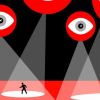-
 +19 +2
+19 +2We’re Making the Facebook Papers Public. Here’s Why and How
Independent experts from NYU, UMass Amherst, Columbia, Marquette, and the ACLU are partnering with Gizmodo to responsibly publish this historic leak.
-
 +18 +6
+18 +6The Demise of White House Market Will Shake Up the Dark Web
YOU’VE PROBABLY NEVER heard of White House Market. Google can't find it. Its vendors don't advertise much. The few public references to the website are on Reddit forums or specialty tech blogs. But among users of the dark web, WHM was, for years, the go-to online marketplace for illegal drugs and fraudulent credit cards.
-
 +15 +2
+15 +2Green IT: A cost or benefit to cybersecurity?
Tony Proctor CITP, Principal Lecturer at the University of Wolverhampton and Emily Proctor, Post-Graduate Student in International Security, discuss whether green IT and cybersecurity can be mutually beneficial.
-
 +25 +2
+25 +2UK security bill to introduce biometric age verification for social media registration
UK government will see the introduction of comprehensive rules to prevent online harms to children, including biometrics-based age checks.
-
 +24 +3
+24 +3The Open Internet on the Brink: Recommendations for a Future Model
The Open Internet on the Brink: Recommendations for a Future Model
-
 +11 +1
+11 +1Is Facebook leading us on a journey to the metaverse?
The concept of the “metaverse” first came from the 1992 sci-fi novel Snow Crash as a place that people flee to escape a dangerous corporation-dominated world. It has since come to refer to a range of virtual experiences that have gained popularity during the pandemic – including video games such as Fortnite, non-fungible tokens or even online meetings and events.
-
 +25 +3
+25 +3In 2030, You Won't Own Any Gadgets
Owning things used to be simple. You went to the store. You paid money for something, whether it be a TV, clothes, books, toys, or electronics. You took your item home, and once you paid it off, that thing belonged to you. It was yours. You could do whatever you wanted with it. That’s not how it is today, and by 2030, technology will have advanced to the point that even the idea of owning objects might be obsolete.
-
 +21 +2
+21 +26 Hacker Pioneers Who Turned the Early Internet on Its Head
In 2021, cybercrime is a normal part of everyday life. But back in the early days of the internet—that is, the 1980s and ‘90s—the hacker was a bizarre new phenomenon that the American public had never encountered before. Many of the trailblazers of this trend weren’t cynical criminals but rather bespectacled teenagers—unadulterated nerds with a penchant for using their advanced computer powers to cause mischief. Back in these days, hacking was less about extortion and moneymaking than it was about hubristic achievement and the desire to do something that had never been done before.
-
 +12 +4
+12 +4How a simple email address makes things complicated
A long time ago, I got some prime email real estate: saramorrison@gmail.com. No middle initial, no extra numbers at the end. Clean, simple, easy to remember. I was truly blessed.
-
 +19 +3
+19 +3The Texas Abortion ‘Whistleblower’ Site Still Can't Find a Host
UNDER A RECENTLY passed Texas law, private citizens can sue anyone involved in helping a person receive an abortion in the state after the sixth week of pregnancy. In response, an anti-abortion group called Texas Right to Life set up a website designed to collect anonymous information about any alleged infractions. Or, at least, it tried to. So far, no company has been willing to host it.
-
 +11 +1
+11 +1‘Panic made us vulnerable’: how 9/11 made the US surveillance state – and the Americans who fought back
It took Edward Snowden and other whistleblowers to reveal the staggering extent of the government’s spying on its own people as institutional checks failed. On the morning of 11 September 2001, an 18-year-old was driving his white Honda Civic on the way to work as a freelance web designer. It was a beautiful day under a sparkling blue sky, and as he sped down Maryland’s Route 32 with the window down and radio blasting, the teenager was sure it was going to be a lucky day.
-
 +19 +4
+19 +4TikTok Is Using Shrek Porn to Fight an Anti-Abortion Website
In a series of events that perfectly follows the natural life cycle of the internet, an anti-abortion group set up a website to enable Texans to become anonymous “pro-life whistleblowers”—that is now being beset by trolls, including at least one wielding Shrek porn.
-
 +22 +3
+22 +3How the Taliban Turned Social Media Into a Tool for Control
In one video, a Taliban official reassured female health workers that they could keep their jobs. In another, militants told Sikhs, a minority religious group, that they were free and protected. Still others suggested a new lawfulness in Kabul, with Talib fighters holding looters and thieves at gunpoint.
-
 +23 +2
+23 +2Artificial Intelligence in the Intelligence Community: Culture is Critical
Several weeks ago, I wrote an article praising the widespread, bipartisan support for the U.S. Innovation and Competition Act (USICA), which would dramatically expand federal government support for U.S. technological growth and innovation in the face of the global AI race.
-
 +20 +2
+20 +2Why We Should End the Data Economy
I know that you know you’re being watched. But I’m not sure you realize the extent of it, or its implications. Hundreds of corporations that you’ve never heard of, as well as many governments around the world, are surveilling you.
-
 +18 +1
+18 +1What Will Be the Language of Our Digital Future?
Without online diversity, only a handful of people will dictate the fate of the world.
-
 +14 +2
+14 +2Cryptocurrency jokes get serious
The cryptocurrency market is becoming one of the few places where internet meme culture can translate into serious money. The big picture: "Joke" cryptocurrencies can thrive when bored people who have cash to spare look for new ways to entertain themselves with seemingly benign bets — hoping that one of those bets could turn into a lucrative investment.
-
 +22 +2
+22 +2Texas Supreme Court Rules Facebook Can Be Held Liable For Sex Trafficking
Texas’ highest court has ruled that Facebook can be held liable for sex trafficking carried out on its social media platforms, after several victims accused the company of knowingly benefiting from its online facilitation.
-
 +21 +4
+21 +4How fraudsters exploited our fears during the pandemic
There are a few basic psychological tricks that phishing attacks and phone scams attempt to use against us – and the pandemic has provided the perfect environment for them.
-
 +17 +1
+17 +1TOLA laws weakening encryption also weaken trust, and pose multi-billion-dollar risk to Australian digital economy
Internet Australia welcomes the release of the first in-depth economic study into the likely detrimental impact of TOLA (Telecommunications and Other Legislation Amendment (Assistance and Access) Act 2018,
Submit a link
Start a discussion




















